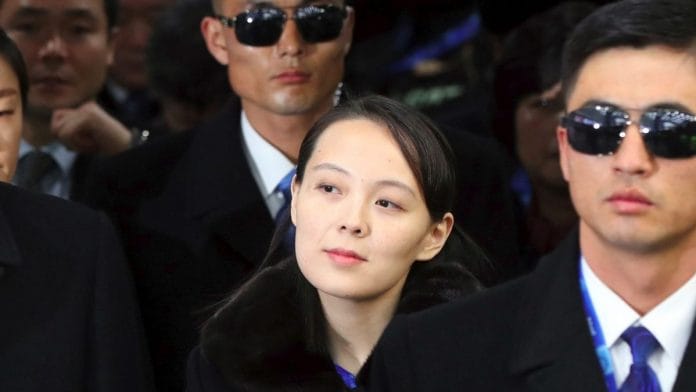Amid rumours that North Korean leader Kim Jong-un could be sick or dead, the increasing talk of his sister Kim Yo-jong becoming the next supreme leader is a fresh reminder of the age-old sexist fascination with women politicians.
There has been a long-held tendency to instantly adopt a differential lens to analyse women politicians, a scrambled attempt to articulate what the “woman” would bring to the table that the man never could. Never mind the utter disregard for underlying political constraints.
But must it be at the cost of propping up just another dictator in an oppressive regime? Apparently yes, and with the expectation that the new woman dictator – owing to her ‘feminine virtues’ – would somehow magically fix the ugly oppressive kingdom her predecessor left.
At the heart of Kim Yo-jong’s sudden thrust into the spotlight is the strange expectation that she will turn North Korea into an open society, and make it give up its nuclear weapons. No one should care about what the military – the guarantor of the dictatorship – might want or if Yo-jong would even be accepted in a deeply sexist society.
In the absence of any evidence regarding the kind of leader Yo-jong might be, she is now being painted as the caricature of a very intelligent princess from a Japanese or Korean anime. The logic is simple — “it’s a very bad world and this new dictator princess will make it a better place”. It is almost as if she is the world’s new benevolent dictator, by just the sheer force of her gender.
Also read: Mystery of Kim Jong Un disappearance & why ‘nuisance states’ like North Korea can’t be ignored
Let’s be real about a woman supreme leader
‘Reading the tea leaves’, is how commentators describe any attempt to decode Chinese politics. But trying to discern something from North Korea is not really an exercise in reading tea leaves. It is more like assuming that these are actual tea leaves you’re looking at, because the very idea of tea might mean something else in the autocratic Korean republic.
Kim Yo-jong is being dubbed as North Korea’s next leader for two main reasons.
First, since independence, North Korea has only been ruled by its founder Kim Il-sung, his son Kim Il, and then grandson Kim Jong-un. And Yo-jong is the youngest known grandchild of Kim Il-sung, thus the only one with the eligible bloodline to carry forward true dynastic rule.
Second, with Yo-jong’s 2014 induction into the ruling Workers’ Party of Korea’s department of propaganda and agitation – one of the key arms of the Communist regime — as its deputy director and her addition to the politburo as a member, has heightened her political profile.
Beyond these details, there is absolutely nothing we know about Yo-jong for certain. There is no sense of how the military feels about a woman supreme leader.
But this is what we already know. For all practical purposes, women have had no role in North Korean politics. Even at the country’s Supreme People’s Assembly – where 20 per cent of the seats are reserved for women – they perform a token role of deputies.
“The primary function of these token deputies seems to be to brighten the optics, by wearing the jewel-toned, floor-length Korean gowns best known by the South Korean term hanbok,” writes Barbara Demick, author of Nothing to Envy: Ordinary Lives in North Korea.
Also read: How Kim Jong Un’s uncle has become suddenly relevant after 4 decades abroad
Age-old sexist intrigue with women dictators
From one oppressive regime after another – there is a peculiar fascination with women leaders. Whether it was Mao’s wife Jiang Qing or the Kurdish militia Women’s Protection Unit, the knee-jerk reaction is to fetishise and not analyse the underlying political considerations. This not only ensures the perpetual reinforcement of a sexist caricature, but also propagates a misleading political understanding.
Mao’s fourth wife, Qing, is one of the best possible representations of this kind of skewed and sexist political analysis. She rose to fame during Mao’s Cultural Revolution owing to her prominent role in the radical “Gang of Four”, which basically ruled China at the time.
Some expected that once Mao was gone, Qing could potentially emerge as Communist China’s leader. But that didn’t happen. Qing drew all her political legitimacy from the fact that she was Mao’s wife. And once Mao died in 1976, she was arrested and blamed by the party for most of the damage caused by Mao’s Cultural Revolution.
Not too far from Beijing, Kim Yo-jong, sitting in some corner of Pyongyang, would meekly remember this series of events from over four decades ago.
Views are personal.







Covid-19 is an extremely dangerous and infectious illness nevertheless, people still made an anime “girl” version of covid-19. People don’t consider “her” a “princess”. Kim’s sister is also now an anime girl majority of people how find enjoyment or entertainment from meme’s doesn’t consider her someone who will change NK for the better…. if anything she’d have to do some hard-line things to keep the militarys backing. Most of us are not simps to the point that we would glorify the next worlds dictatorship.